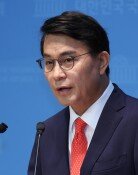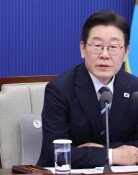Medvedev Favored to Win Russian Pres. Election
Medvedev Favored to Win Russian Pres. Election
Posted March. 03, 2008 03:00,
Russias fifth presidential election was held yesterday, with Deputy Prime Minister Dmitri Medvedev of the United Russia Party the heavy favorite to win.
Medvedev was expected to beat rivals Gennady Zyuganov of the Communist Party and Vladimir Zhirinovsky of the Liberal Democratic Party.
The results of exit polls by survey organizations showed that Medvedev, who has been selected by outgoing President Vladimir Putin, is likely to win between 60 and 73 percent of the vote.
Despite heavy snow in Moscow in the morning, voter turnout this year is expected to top that of the 2004 presidential election. As of 10 a.m., the nationwide turnout is estimated to be three to five percent higher than in the 2004 election, said Vladimir Churov, chairman of Russias election commission.
The United Russia Party and the Kremlin predicted a low turnout for young voters in this election and held campaigns encouraging participation at schools and workplaces. On Election Day, major mobile operators in Russia such as MTS, BeeLine and Megafon also sent messages to service users urging them to vote.
I heard the election this time much resembles the way the general secretary of the Communist Party was appointed in the old days of the Soviet Union (in that the government-nominated candidate was the most likely to win), but as a Russian, there seems to be few alternatives to choose from, said one university student who voted in the southwestern region. I also voted for Medvedev.
Some predict that with the high turnout, Medvedev will beat Putins approval rate of 71.3 percent in the 2004 presidential election.
State-run broadcasters released the results of exit polls around 9 p.m. Saturday. The results of provisional ballot counting were set for announce at 10 a.m. Monday and the official election result will come Friday.
Forces opposed to the maligned election, including former world chess champion Garry Kasparov, planned demonstrations in Moscow and St. Petersburg.
Major countries in Western Europe did not dispatch election monitors or reduced the number of dispatched monitors below the initial level. They said the Russian presidential election took undemocratic steps in allowing the Kremlin to control the media and administrative bodies to intervene excessively.
viyonz@donga.com







